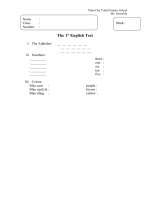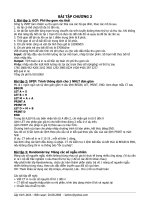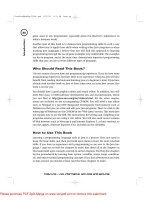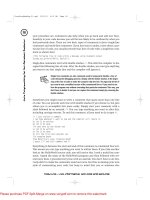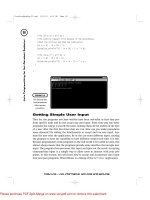Java practice problems (beginner level)
Bạn đang xem bản rút gọn của tài liệu. Xem và tải ngay bản đầy đủ của tài liệu tại đây (119.13 KB, 6 trang )
Java Practice Problems – 1
Classes, Methods, Loops, Control Statements, Arrays
1. Write a java function that will take a sequence of positive integer numbers as input from
the keyboard and find the summation of the odd numbers only.
2. Design a class named Student that has two private data – student id and score. The class
should contain a parameterized constructor to initialize its data member and one method
to display the information. Now write a Java program that will use an array of Student
objects to represent information about 3 students. Your program should take input from
the keyboard and display the information of the 3 students.
3. Write a program to take some numbers as command-line arguments and display their
summation.
4. Take two numbers from the user and display the summation of the odd numbers and the
summation of the even numbers. Now, display the difference between the two results.
5. Write a class named Area based on the following:
a. No class variable is needed.
b. Use the overloaded method getArea() to compute area of a rectangle and circle.
c. Use floating-point numbers (double) as parameters as well as return types.
d. Use Math.PI to compute area of a circle.
Write another class named AreaTesting to verify the correctness of all the methods
in the above class.
6. Write a class named TestClass and add a String data field called data1. The data field
should be private to the class. Now, add a constructor that accepts a starting value for
data1 as its single parameter, and public methods for setting and retrieving the value of
data1. Call these methods setData() and getData().
7. Take 3 integers as inputs from user and assign them to 3 variables called num1, num2 and
num3. Now, write the necessary instructions to find both the largest number and the
smallest number among them.
8. If the variable num1 is equal to 5 and the variable num2 is equal to 10, how would you
evaluate the logical expression ((num1 != 5) || (num2 == 10)) && !(num1 == 5) ?
Show each step of the evaluation.
9. Write a while, a do-while and a for loop that will result in infinite loops.
10. Write a do-while loop that can never execute more than once.
1
11. Write a while, a do-while and a for loop that will count backwards from 20 to 10.
12. Write a for loop that counts by twos (i.e., the loop is incremented by 2).
13. Write a for, a while and a do-while loop that can never execute.
14. Create an array that can hold 50 double type values. Now, write a for loop that
initializes the array to the values 50.0 through 99.0.
2
1.
2.
3
import java.util.Scanner;
public class Main {
public static void main(String[] args) {
Scanner in = new Scanner(System.in);
int sum = 0, temp;
while (in.hasNextInt()) {
temp = in.nextInt();
if ((temp % 2) == 0) {
sum += temp;
}
}
System.out.println(sum);
}
}
import java.util.Scanner;
class Student {
private int student_ID;
private int score;
Student(int std_ID, int s) {
student_ID = std_ID;
score = s;
}
void display() {
System.out.println("ID: " + student_ID + ", score: " + score);
}
}
public class Main {
public static void main(String[] args) {
Student students[] = new Student[3];
//Input Student information
Scanner in = new Scanner(System.in);
int stdID, stdScore;
for (int i = 0; i < 3; i++) {
System.out.print("Enter student ID: ");
stdID = in.nextInt();
System.out.print("Enter score: ");
stdScore = in.nextInt();
students[i] = new Student(stdID, stdScore);
}
//Display student information
for (int i = 0; i < 3; i++) {
students[i].display();
}
}
}
3.
4.
5.
4
public class Main {
public static void main(String[] args) {
int sum = 0;
for (int i = 0; i < args.length; i++) {
sum += Integer.parseInt(args[i]);
}
System.out.println(sum);
}
}
import java.util.Scanner;
public class Main {
public static void main(String[] args) {
Scanner in = new Scanner(System.in);
int sumOdd = 0, sumEven = 0, temp;
while (in.hasNextInt()) {
temp = in.nextInt();
if ((temp % 2) == 0) {
sumEven += temp;
} else {
sumOdd += temp;
}
}
System.out.println(sumOdd);
System.out.println(sumEven);
System.out.println(sumOdd - sumEven);
}
}
class Area {
//Area of a rectangle
double getArea(float length, float height) {
return length * height;
}
//Area of a circle
double getArea(float radius) {
return Math.PI * radius * radius;
}
}
public class AreaTesting {
public static void main(String[] args) {
Area rectangle = new Area();
System.out.println(rectangle.getArea(5.2f, 3));
Area circle = new Area();
System.out.println(circle.getArea(5.2f));
}
}
6.
7.
5
class TestClass {
private String data1;
TestClass(String val) {
data1 = val;
}
void setData(String val) {
data1 = val;
}
String getData() {
return data1;
}
}
import java.util.Scanner;
class Test {
public static void main(String[] args) {
int num1, num2, num3;
Scanner in = new Scanner(System.in);
num1 = in.nextInt();
num2 = in.nextInt();
num3 = in.nextInt();
//Finding out the largest number
if (num1 > num2) {
if (num1 > num3) {
System.out.println("Largest number is: " + num1);
} else {
System.out.println("Largest number is: " + num3);
}
} else {
if (num2 > num3) {
System.out.println("Largest number is: " + num2);
} else {
System.out.println("Largest number is: " + num3);
}
}
//Finding out the smallest number
if (num1 < num2) {
if (num1 < num3) {
System.out.println("Smallest number is: " + num1);
} else {
System.out.println("Smallest number is: " + num3);
}
} else {
if (num2 < num3) {
System.out.println("Smallest number is: " + num2);
} else {
System.out.println("Smallest number is: " + num3);
}
}
}
}
8. First Step: ((false || true) && !true)
Second Step: (true && false)
Third Step: false
9.
10.
11.
12.
13.
14.
6
while (true)
do {} while (true);
for (;;)
Alternatively:
while (true) {}
do {} while (true);
for (;;) {}
do {} while (false);
class Test {
public static void main(String[] args) {
int num = 20;
while (num >= 10) {
System.out.println(num);
num ;
}
num = 20;
do {
System.out.println(num);
num ;
} while (num >= 10);
for (num = 20; num >= 10; num ) {
System.out.println(num);
}
}
}
for (int i = 0; i < 5; i += 2) {}
while (false) {}
for (int i = 0; i > 2; i++) {}
For any given condition, do-while loop will always execute at least once.
double arr[] = new double[50];
for (int i = 0; i < 50; i++) {
arr[i] = i + 50;
}
